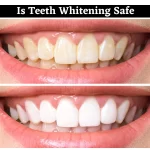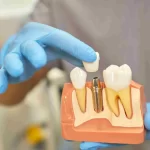With a success rate of over 98%, dental implants are one of the best options for permanently replacing missing teeth. Dental implants successfully improve chewing efficiency, enhance aesthetics, and lead to an overall improvement in the quality of life. Failure and loss of dental implants may occur due to a variety of reasons, and there may be risk factors that anyone opting for a dental implant procedure should be made aware of.
Risk Factors Associated with Dental Implant Surgery
Infections:
It is important to follow the instructions given by the dentist in the post-operative period after dental implant surgery. The most essential part of this is maintaining regular oral hygiene and keeping the area around the surgical site clean. Infections tend to develop in areas of plaque build-up and, if left untreated, can lead to an inflammatory condition known as peri-implantitis. Peri-implantitis leads to loss of bone around the implant and is the most common cause of dental implant failures.
Damage to Surrounding Structures:
Any kind of surgery carries the risk of damage to nerves, blood vessels, and surrounding tissues. While these instances are rare, the probability of something like this happening directly correlates to the expertise and skill level of the dentist performing the surgery. If the dental implant is even placed too close to a nerve, it can result in complications like pain while performing routine actions, tingling sensations, and even numbness.
Failure of Osseointegration:
Osseointegration is the process by which the dental implant fuses with the surrounding bone in which it is drilled. Osseointegration is essential for the success and stability of the dental implant, which allows it to withstand chewing and biting forces almost like a natural tooth. Failure of osseointegration can occur for a variety of reasons, like:
- Inadequate quantity or quality of the jawbone
- Fracture of the dental implant
- Movement of the implant during the healing period or before it has achieved primary stability
- Poor treatment planning at the hands of the dental surgeon
Risk Factors that Affect the Success of Dental Implants
Periodontal Disease:
Patients with active periodontal disease are not considered good candidates for receiving dental implants. They can be fitted with the same once they have undergone treatments for periodontitis with complete resolution of the disease. However, it has been noted that patients with a history of periodontal disease often have higher chances of developing peri-implantitis. If adequate oral hygiene is not maintained regularly, periodontitis can make a come-back and eventually lead to failure of the dental implant.
Smoking:
Smoking has been directly correlated with an increased incidence of dental implant failure. Smoking leads to decreased blood flow at the implant site. This can hinder the healing process since it requires essential nutrients that are supplied via ample blood flow to the implant site. Delayed healing further leads to infections that can reach the bone and cause peri-implantitis.
Patient-Related Concerns:
The success and longevity of a dental implant depend on multiple factors. For starters, taking care of the dental implant by not applying unnecessary force on it and keeping the implant site clean is the patient’s responsibility. In addition to that, habits like clenching or grinding of teeth can eventually damage the dental implant and lead to its failure. Such patients may be required to wear a night guard while sleeping.
Dental implants are made up of biocompatible materials like titanium or zirconia. However, some patients may develop an allergic reaction to the presence of trace elements like nickel found in titanium dental implants. The body ends up rejecting the dental implant in such cases, and the patient may have to resort to other means of tooth replacement options.


















